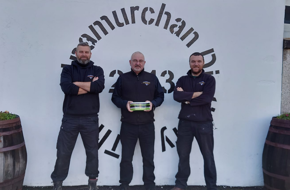Highlights
- Fully reliant on locally sourced renewable energy.
- The distillery’s heating is fully provided by their biomass boiler.
- Closed loop water system, which significantly reduces water used.
- Spent lees disposed of via reed bed system to reduce environmental impact.
- By-products collected and processed locally into animal feed.
- Packaging made of 100% recycled material.
- Company cars are fully electric and both of their sites have charging points powered by renewable sources.

Ardnamurchan Distillery, part of Adelphi Distillery Ltd, is Scotland's most westerly mainland distillery. Their main market is the UK, but it is also sold in 27 other markets, across the world. Adelphi Distillery have demonstrated a clear commitment to sustainability, integrating a suite of technologies and best practice to minimise their environmental impact while generating economic and wider social benefit for the community of Ardnamurchan peninsula.
Established in 2014, Ardnamurchan Distillery has shown an ongoing commitment to finding and putting in place sustainable solutions for their operations, which minimise their environmental impacts: the design of the distillery includes pioneering work to enable it to be fully reliant on locally sourced renewable energy: hydro electricity from the river and wood chip from a local farm. Traditionally, a distillery of similar size would be using 700,00 litres of oil per year, not including transport fuel, to and from the distillery; but this Adelphi Distillery succeeded to reduce their oil consumption to zero.
Energy sources
The distillery’s hydroelectric generator, produces more electric energy than that the business requires; the excess power is supplied to the grid, making this Adelphi distillery a net contributor to the grid.
The distillery’s biomass boiler is 100% fuelled by wood chip from Woodland Renewables, a local business that supplies them locally harvested wood chip from renewable forestry.
The company’s cars are fully electric and both Adelphi distillery sites have charging points, powered by renewable sources. This enables employees, visitors and also locals to charge their vehicles.
Reducing resources use
The largest use of water in a distillery is in the cooling the condensers. In this distillery, the water used in the hydroelectric generator is also used as cooling water for the condensers. The use of cooling water is further reduced by the use of a water miser (water economiser), a modern version of a cooling tower. This water miser is a ‘closed loop’ system, where the water gets re-circulated and cooled. This reduces water usage from 400 m3 to 30m3, and allows the river to keep its natural flow, which brings benefits in terms of increased biodiversity.
Circular economy and reducing waste
Whisky bottles are made with 65% recycled content, approximately, which is above the current industry standard of 51%.
Packaging of the bottles is made with 100% recycled material; and limited-edition bottles are retailed without a box, to reduce waste packaging, and and using Scottish sources wherever possible.
The distillery process by-products, pot ale and draff are supplied to Woodland Renewables, the same local company that provides them with wood chips. The tractor and trailer deliver the wood chips, and then return with the the draff from the distillery,ensuring there are no wasted journeys. The draff and spent lees is piped across the hill over to the plant in two separate pipes. The pot ale and draff are then processed at the plant and fed to the local livestock, and the excess can be sold as highly nutritious animal feed, benefitting the local economy.
The spent lees is currently disposed of via a reed bed system to reduce- environmental impact.
Sourcing of raw materials
As many of this Adelphi distillery’s raw materials as possible, are sourced within Scotland or the UK. The barley used comes from West Fife, and the glass bottles and recycled packaging are made in Scotland.
Ongoing improvement
Adelphi Distillery continues to actively explore further sustainability options for their operations, such as looking into:
- how best to reducing the impact of caustic waste-water discharges – the current preferred option is also to reed beds via settling tank;
- possibility of green hydrogen production - as they have a steady supply of hydroelectricity;
- Further habitat restauration action.
Social influence
This Adelphi distillery sits on a remote peninsula, and is now the second largest employer in the area. By partnering with the local company Woodland Renewable to do business with, they further enhance the local economy. In addition, increased numbers of visitors to the distillery have helped boost local hotel room occupancy, restaurant covers and neighbouring attraction visits.
Ardnamurchan Distillery combined with the Ardnamurchan Trust to assign casks of new spirit to children living in the local area. The children is then encouraged to sell the casks back to the distillery once they become of legal drinking age, giving them much needed finances to put towards tertiary education. In the meantime, the distillery will offer them practical training and insight into future employment in the industry.